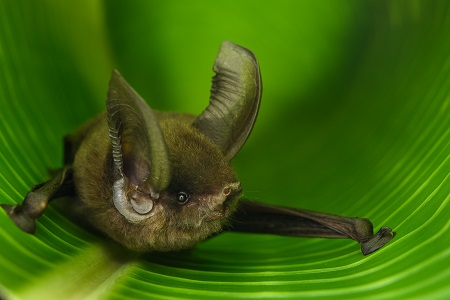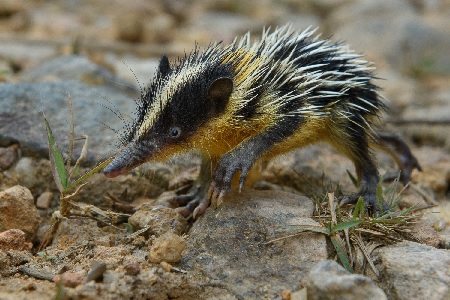Bedreiging voor zoogdieren op Madagascar
Een internationaal onderzoek waarbij RUG-ecoloog Luis Valente betrokken is laat zien dat er drie miljoen jaar evolutie nodig is om het door mensen veroorzaakte verlies aan soorten op Madagascar weer te laten herstellen. Maar als soorten die nu bedreigd zijn ook uitsterven, zou de tijd voor herstel toenemen met nog eens 20 miljoen jaar, een hersteltijd die veel langer is dan ooit werd gevonden op andere eilanden. Dit is op 10 januari gepubliceerd in het tijdschrift Nature Communications.
Het eiland Madagaskar is een van de belangrijkste hotspots van biodiversiteit ter wereld, met onder meer unieke soorten baobabs (een boomsoort) en lemuren (primaten). Ongeveer 90 procent van alle soorten planten en dieren vind je nergens anders. Nadat mensen zich zo’n 2500 jaar geleden permanent vestigden op dit eiland zijn er veel dieren uitgestorven, zoals de reuzen lemuren, olifantsvogels en dwergnijlpaarden. Maar de rijkdom in diersoorten is nog redelijk intact, zeker in vergelijking met de meeste andere eilanden. Er leven nog zo’n tweehonderd soorten zoogdieren, waaronder unieke soorten als de ringstaartmaki en de fretkat. Het slechte nieuws is dat meer dan de helft van deze soorten bedreigd wordt met uitsterven, vooral door menselijke activiteiten.

Fossielen
Maar hoe hebben mensen de natuur van Madagaskar verstoord, en wat zal er gebeuren wanneer die verstoring gewoon doorgaat? Een team biologen en paleontologen uit Europa, Madagaskar en de VS wilden deze vragen beantwoorden. Daarvoor verzamelden zij een unieke dataset waarin de evolutionaire relatie tussen alle soorten zoogdieren op Madagaskar is beschreven, vanaf de tijd dat mensen het eiland koloniseerden. Er zijn gegevens over dieren die al zijn uitgestorven, waarvan we alleen de fossielen kennen, en over nog aanwezige soorten.
De onderzoekers vonden 249 verschillende soorten zoogdieren, waarvan er dertig zijn uitgestorven. Verder zijn 120 van de 219 nog bestaande soorten geklassificeerd als ‘bedreigd met uitsterven’, ze staan op de Rode Lijst van de International Union for Conservation of Nature and Natural Resources (IUCN). De bedreiging komt van vernietiging van leefgebieden, klimaatverandering en de jacht.

Invloed
Met behulp van een computer model gebaseerd op de theorie van eiland-biogeografie heeft het team van biologen van de RUG, het Leidse Naturalis en de Association Vahatra (op Madagaskar) berekend dat het ongeveer drie miljoen jaar zal duren voordat het aantal zoogdieren op Madagaskar weer op het niveau is van voor de menselijke kolonisatie. Maar als de nu bedreigde soorten ook uitsterven zal het herstel nog veel langer duren: 23 miljoen jaar. In de afgelopen tien jaar is die hersteltijd al met enkele miljoenen jaren gestegen omdat de negatieve invloed van mensen op het eiland steeds verder toeneemt.

Waarde
De enorme tijd die nodig zal zijn voor herstel verraste de onderzoekers: ‘Het is veel langer dan wat eerdere onderzoeken vonden voor herstel op New Zeeland of eilanden in de Caraïbische regio’, vertelt onderzoeksleider Luis Valente. De resultaten van het onderzoek suggereren bovendien dat een nieuwe uitstervingsgolf aanstaande is. Dat zou een grote invloed op de evolutionaire hersteltijd hebben.
Het goede nieuws is dat het onderzoek ook laat zien hoe het mogelijk is om 20 miljoen jaar aan evolutionaire geschiedenis op het eiland te bewaren. Valente: ‘We wisten al dat Madagaskar een hotspot van biodiversiteit is, en ons nieuwe onderzoek laat zien hoe waardevol die is. Het toont vanuit evolutionair perspectief hoe groot de winst is die we behalen door de natuur van Madagaskar te beschermen.’
Referentie: Nathan M. Michielsen, Steven M. Goodman, Voahangy Soarimalala, Alexandra A.E. van der Geer, Liliana M. Dávalos, Grace I. Saville, Nathan Upham, Luis Valente: The macroevolutionary impact of recent and imminent mammal extinctions on Madagascar. Nature Communications , 10 januari 2023.
Meer nieuws
-
10 februari 2026
Waarom slechts een klein aantal planeten geschikt is voor leven
-
09 februari 2026
Kunnen we de aarde de andere kant op laten draaien?

